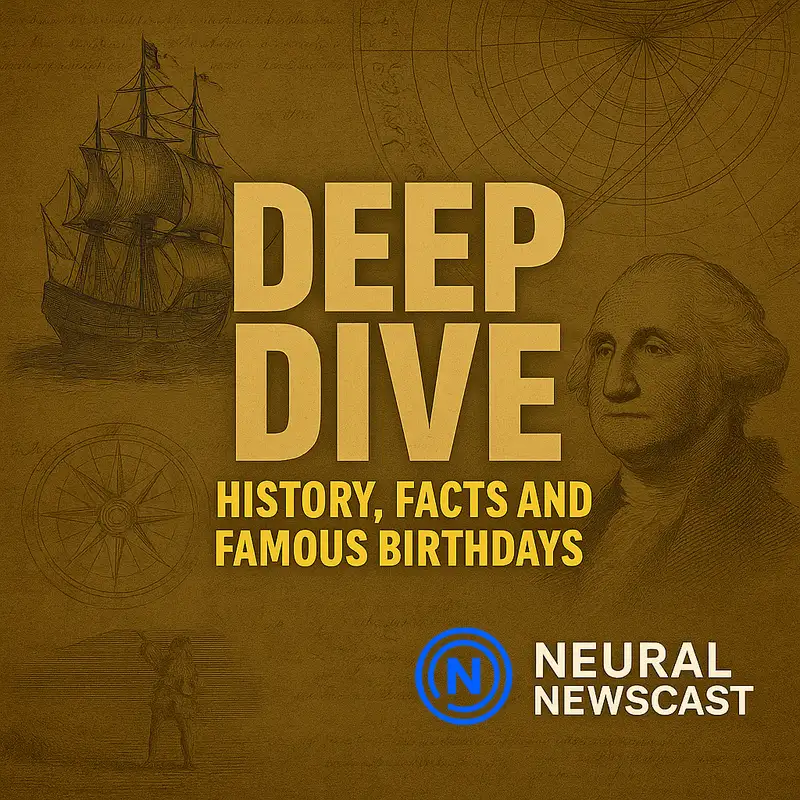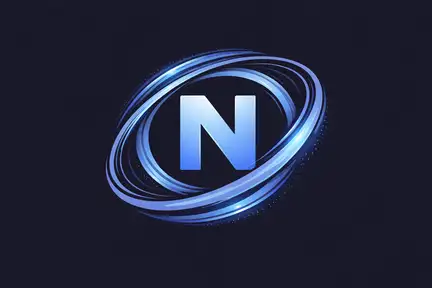Deep Dive: Juneteenth's Legacy & Eisenhower’s Impact: From Freedom to Highways - June 19, 2025
We move at the speed of code, without losing the human touch.
This is Neural Newscast.
Thanks for joining us for this Neural Newscast deep dive.
I'm Cassandra, and alongside Kara, we're about to uncover some intriguing stories.
You know, Kara, on this day back in 1865, we had a defining moment in American history.
Union soldiers arrived in Galveston, Texas and announced the end of the Civil War which
essentially marked the first celebration of what we now know as Juneteenth.
It's such a pivotal moment, and yet not everyone is fully aware of its significance.
It's incredible to think about, Cassandra.
The fact that this news took so long to reach Texas, considering the Emancipation Proclamation
was issued way back in 1863, just highlights the stark differences in communication and
technology back then compared to today.
Imagine that delay in our current age of instant connectivity.
Right?
It's a perspective shift on just how delayed news could be in those days.
The announcement by Union General Gordon Granger on June 19, 1865, was a critical turning point.
Imagine the emotions of those who heard the news, realizing the years of struggle were finally acknowledged.
It's a moment filled with relief and overwhelming change after such a prolonged period of oppression.
Exactly. And it underscores the power of information dissemination.
Today, we have information overload, but back then, a single announcement carried the weight of freedom.
It's a testament to the transformative power of communication and how vital it is for progress.
And let's not forget the immense courage and resilience of those who lived through it.
They had to navigate the aftermath and build new lives amid the chaos of reconstruction.
It's a stark reminder of the complexity of societal change.
It is.
You know, when I think about how technology has evolved,
it's astounding to consider the tools we have today to amplify voices and create awareness.
If they had our tech back then, the story might have unfolded quite differently.
True, and yet, the essence remains.
Celebrating Juneteenth now serves as a reminder and a call to action,
acknowledging past injustices while striving for a more equitable future.
It's a day rich with history and meaning,
inviting us to reflect on how far we've come and how much further we need to go.
Absolutely. It's about remembering the past and using it to inform a better, more connected future.
The lessons from that era are still relevant, especially as we navigate our complex digital landscape.
It's fascinating and a bit daunting when you think about the parallels in societal shifts then and now.
It sure is. And on days like today, reflecting on Juneteenth, we're reminded that progress is a journey, not a destination.
The struggles and the triumphs of those who came before us set the stage for where we stand now and where we hope to go.
Today we celebrate the birthdays of Dwight D. Eisenhower, 1890, Rold Dahl, 1916, and Peter Settera, 1944.
Eisenhower is definitely a fascinating figure to talk about.
I mean, not just a president, but a five-star general in the army during World War II.
Quite the resume, right?
Absolutely, Kada.
Eisenhower's presidency from 1953 to 1961 was transformative in many ways.
He wasn't just about military might.
His administration saw the launch of significant civil rights initiatives
and the creation of the interstate highway system,
which revolutionized American infrastructure.
The interstate system really changed how people traveled
and how goods were transported across the country.
It's hard to imagine modern America without it.
And was it the idea partly a military strategy
for rapid troop movements?
Exactly.
Eisenhower was influenced by his experiences in World War II.
The highways were designed not only for public use, but also for strategic defense purposes.
His insight into infrastructure planning showcases how his military background seeped into his presidency.
And speaking of his military background, let's not forget his role as the supreme commander of the Allied Expeditionary Force in Europe.
D-Day, as we know it, wouldn't have been the same without his leadership.
That's true.
His leadership on D-Day was pivotal.
He was able to coordinate the complex logistics and strategy needed for the largest amphibious
invasion in history.
But what's even more intriguing is his demeanor during the campaign.
He was known for his calm and steady leadership, which inspired confidence among the troops.
And in a time of nuclear tension, with the Cold War heating up, Eisenhower's stance on
diplomacy and peace was crucial.
He gave that famous Atoms for Peace speech to the UN, which aimed to ease tensions and
promote peaceful nuclear technology.
Yes, that speech marked a significant shift in how nuclear energy was viewed worldwide.
Instead of just a weapon, nuclear power began to be seen as a potential force for good.
Eisenhower's focus on peace and cooperation left a lasting legacy in international relations.
It's impressive how his initiatives still reverberate today.
You think about the highways, civil rights, and nuclear policy.
His influence is foundational.
And just think.
All of this insight and leadership came from someone who initially pursued a career in the military rather than politics.
Indeed, Eisenhower's journey from a military leader to a transformative president underscores his adaptability and vision.
His legacy is a testament to the power of strategic foresight and balanced governance.
So true, and it's a reminder of how the past constantly shapes our present,
both in policy and infrastructure. A fascinating man with a lasting impact.
We'll be right back after this short break.
This is Neural Newscast, where machine learning meets meaningful reporting.
All stories are reviewed for accuracy before release.
Find our full archive at neuralnewscast.com.
Thanks for staying with us on Neural Newscast Deep Dive.
Let's get back to our discussion.
So, Kara, did you know that pilots and co-pilots on commercial flights
are required to eat different meals?
Really? That's fascinating.
I assume it's a precautionary measure, right?
To avoid food poisoning or something like that?
Exactly.
Airlines do this to ensure that if one of them gets sick due to food poisoning,
the other one remains unaffected and can safely manage the flight.
Makes perfect sense.
It's kind of like a redundancy in software systems.
Having a backup ensures continuity when one part fails.
That's a great analogy.
And it's not just food precautions.
The entire airline industry is built around safety and multiple layers of backup systems.
Think about the protocols they follow.
Everything is designed to minimize risk.
Right, and with aviation technology advancing so rapidly, it seems like there's always something new being implemented.
New navigation systems, enhanced autopilot features.
Technology is really taking flight, if you'll pardon the pun.
Absolutely.
Yet despite technological advancements, the human element remains crucial.
Pilots are trained rigorously to handle unexpected situations,
and that training complements the tech in the cockpit.
It's like having the best of both worlds, technology for precision and humans for adaptability.
Do you know if there are any other quirky regulations like the meal one?
Oh, there are plenty.
For instance, most people don't realize that pilots also have strict guidelines about sleep schedules.
It's all regulated to ensure they're well rested before taking control of a flight.
That's interesting. Almost like how developers are encouraged to push code when well rested to avoid errors.
A tired mind just doesn't perform optimally.
Exactly. And speaking of sleep, have you heard about the controlled rest policy on long flights?
I haven't. What's that about?
Well, on longer flights, there's often a policy that allows pilots to take short naps while the aircraft is cruising on autopilot.
Under strict conditions, of course.
Really? So it's like a power nap at 30,000 feet? That's wild.
I suppose every minute of rest counts when you're dealing with such high stakes.
Precisely. It's a carefully monitored procedure and there are always at least two pilots awake at any given time.
Safety remains the top priority.
Fascinating how all these little-known facts contribute to safety and efficiency.
It's like each piece, whether technology or policy, works in tandem to ensure a smooth flight.
And it's a good reminder that even the most commonplace experiences, like flying,
involve a web of intricate details working behind the scenes.
Definitely makes you appreciate the hidden complexities next time you board a plane.
We hope you enjoyed this deep dive.
From Cassandra and all of us at Neural Newscast, I'm Kara.
Join us next time.
That wraps up today's journey through time on NNC, Neural Newscast.
Discover more stories and daily news episodes at our website, nnewscast.com.
Neural Newscast integrates real and AI-generated voices to facilitate efficient, high-quality
news production.
Developed by human experts, our AI-generated content undergoes rigorous fact-checking and
human review before publication.
While we strive for accuracy and neutrality, AI-generated content may occasionally contain
errors.
We encourage listeners to verify crucial details from reliable sources.
For more on our AI transparency practices, visit newscast.com.
Creators and Guests




